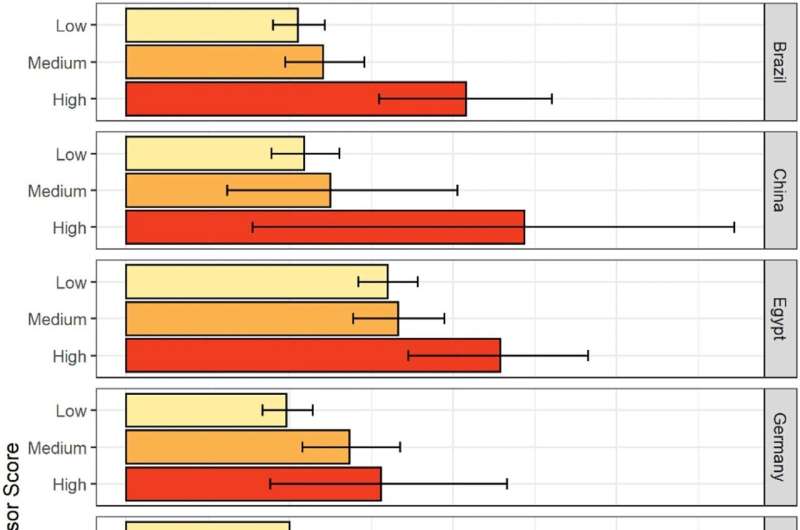This article has been reviewed according to Science X's editorial process and policies. Editors have highlighted the following attributes while ensuring the content's credibility:
fact-checked
trusted source
proofread
Food insecurity, job loss contributed substantially to worldwide mental health decline during first COVID phase: Study

Many studies have documented the decline in mental health throughout the pandemic, but new analyses led by School of Public Health researchers paint a sharper picture of the factors that placed the greatest burden on psychological health across the globe.
One study, published in the journal Social Psychiatry and Psychiatric Epidemiology, examined COVID-19-related social or economic disruptions and their effect on psychological disorders in eight countries.
The findings showed that experiencing more stressors due to the pandemic—ranging from loneliness and relationship problems to food insecurity and job loss—during the first phase of the pandemic was associated with a higher burden of depression and PTSD around the world, regardless of countries' differences in cultures, economics, and demographics. These increases in depression and PTSD persisted even when accounting for COVID cases and mitigation policies.
Higher income was generally linked with a higher prevalence of depression symptoms while the opposite was true for PTSD symptoms, but these symptoms also varied by income levels within each country, suggesting that the influence of specific stressors can vary considerably depending on context.
"These findings underscore the importance for policymakers to integrate mental health considerations in their response to disease outbreaks," says study lead author Dr. Salma Abdalla, assistant professor of global health and epidemiology. "Additionally, the results highlight the imperative for both researchers and policymakers to conduct localized assessments to understand and address the specific forces that contribute to the mental health burden."
For the study, Dr. Abdalla and colleagues utilized survey data among people in Brazil, China, Germany, Egypt, India, Indonesia, Nigeria, and the United States, from September 2020 to November 2020.
Participants answered question about experiences with depression and PTSD, as well as 10 various COVID-related stressors, including cancellation of a milestone event, seeing family or friends less, working remotely, death due to COVID-19 among family or friends, family relationship problems, challenges in finding childcare, loneliness, a shortage in food or supplies, self/family member job loss, or financial problems.
Among 8,754 respondents, 29 percent experienced depression symptoms, while 5 percent experienced probable PTSD. The highest prevalence of depression symptoms was in Egypt (41 percent) and the lowest prevalence was in the United States (25 percent). The highest prevalence of probable PTSD was in Brazil (7.3 percent and the lowest prevalence was in China (1.2 percent).
The socially oriented stressors such as family or relationship problems, loneliness, and difficulty in finding childcare were linked to a higher prevalence of depression compared to economic stressors. Both social and economic stressors contributed to a greater likelihood of developing PTSD in all of the countries, particularly among people who experienced difficulty obtaining food.
Utilizing the same datasets, Dr. Abdalla led a second study, published in the journal SSM—Mental Health, that focused more closely on these psychological conditions and disruptions to specific social determinants of health, including self/family member job loss, financial problems, and shortages in food and supplies among the same eight countries.
Similarly, these findings also show that pandemic-related problems with employment, finances, and food security were associated with a higher burden of depression and probable PTSD in countries, regardless of geographic, economic, social, or political differences.
This association was particularly strong with the prevalence of probable PTSD, which was three times higher among people who experienced at least one COVID-related disruption—particularly a shortage in food or supplies—compared to people who experienced no disruptions.
Nearly four years after the start of the pandemic, many people around the world are still navigating these challenges; the researchers emphasize that small and large-scale interventions can address these issues, from mental health screenings to broader safety-net policies that provide financial support and resources to people struggling with food insecurity or unemployment.
"Existing government welfare policies even prior to the pandemic, as well as other contextual factors, play a factor in how social determinants of health disruptions contributed to adverse mental health outcomes," Dr. Abdalla says. "Future work should focus on these contextual factors."
More information: Salma M Abdalla et al, Pandemic stressors and mental health indicators in eight countries, Social Psychiatry and Psychiatric Epidemiology (2023). DOI: 10.1007/s00127-023-02541-w
Salma M. Abdalla et al, Disruptions to the social determinants of health and mental health indicators during the pandemic in eight countries, SSM—Mental Health (2023). DOI: 10.1016/j.ssmmh.2023.100249




















